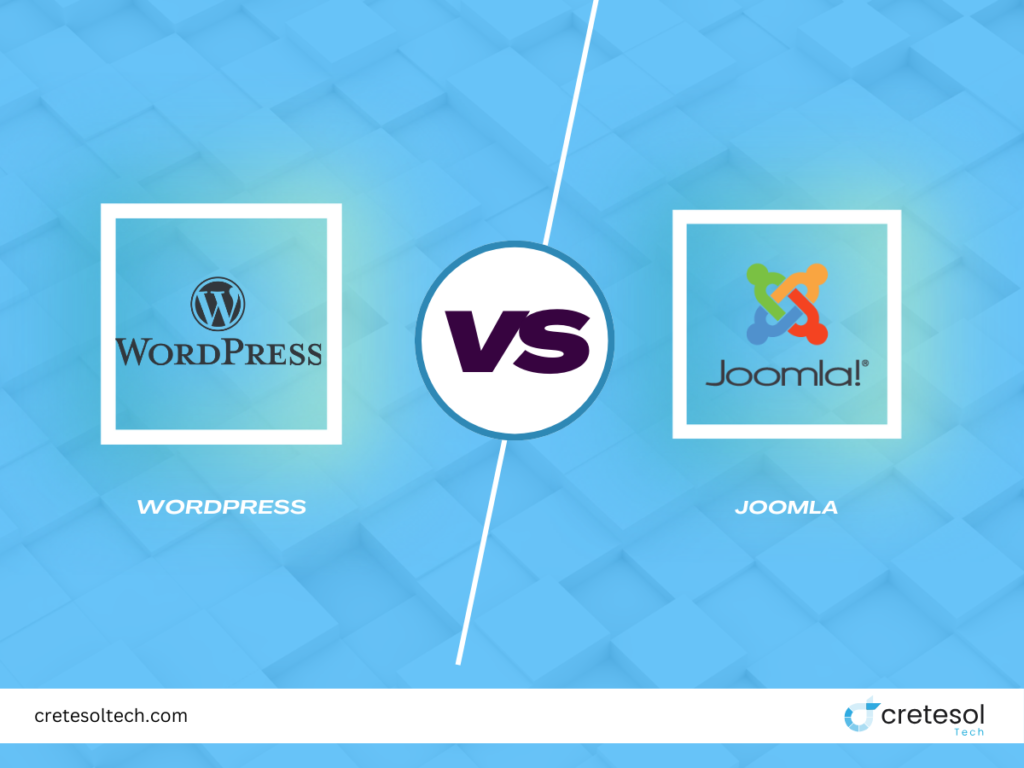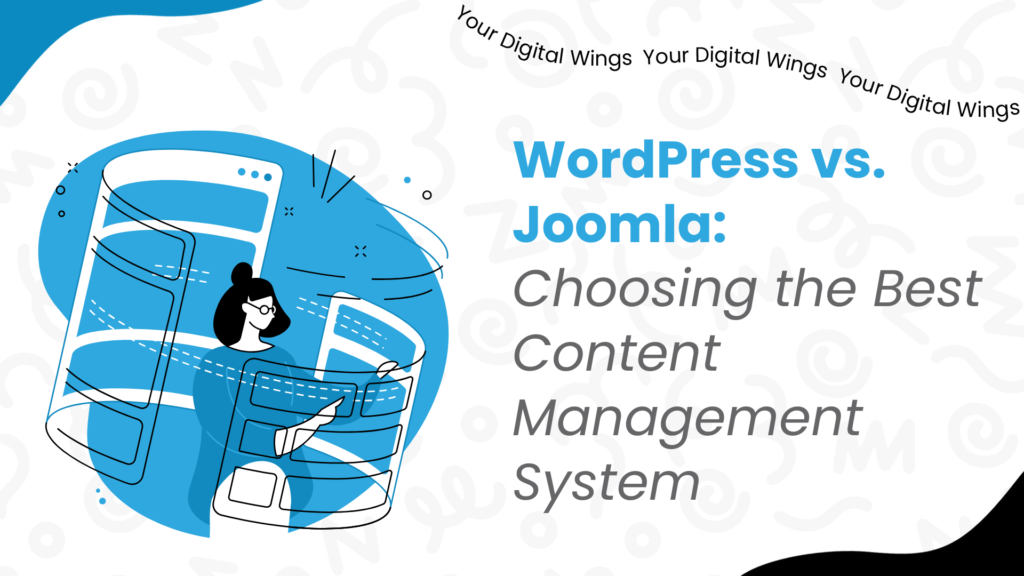The selection of the appropriate Content Management System is relevant when developing a website. Both WordPress and Joomla are free, open-source content management systems that have their unique features for different types of users. The WordPress vs. Joomla comparison will help you decide which platform aligns better with your goals by exploring interface design, user experience, plugin/extension flexibility, and customization capabilities.
It doesn’t matter if you are a blogger, a business owner, or a developer; knowing these strengths and limitations of CMS options for professional web development will ensure your website stands out in today’s competitive digital landscape.

Interface and User Experience Comparison
WordPress: Simple, Intuitive, and User-Friendly
WordPress is known to be very simple and user-friendly, even for beginners. Its dashboard is clean and well-organized, from where one can manage contents, settings, and plugin installation.
Advantages:
- Minimal learning curve for non-technical users.
- Streamlined content editing with the Gutenberg Block Editor.
- A favorite for bloggers due to its reputation as the Best CMS for customization.
Agencies, such as a web design company in Dubai, would recommend WordPress to clients for quicker and more straightforward solutions that they want to have on their websites. It is easy to use, even by an individual with minimal technical skills, to build and maintain a professional site.
Joomla: Versatile but Complex
Joomla offers a more robust interface tailored for users with some technical know-how. While it allows for greater control and flexibility, its backend can feel overwhelming to beginners.
Advantages:
- Advanced options for menu management and user permissions.
- Flexible module system for creating unique layouts.
For experienced developers or businesses with specific needs, Joomla provides a powerful toolkit. However, its steeper learning curve might deter users looking for a WordPress easy-to-use CMS alternative.
Extensions vs. Plugins
WordPress: Plugins for Every Need
WordPress boasts an extensive library of over 60,000 plugins, covering everything from SEO optimization to e-commerce functionality. Plugins are easy to install and often come with user-friendly interfaces.
Popular Plugins:
- WooCommerce for e-commerce.
- Yoast for SEO.
- Jetpack for performance and security.
These plugins, combined with the WordPress open-source advantages, make the platform a versatile choice for various website types.
Joomla: Extensions for Advanced Customization
While Joomla may lag behind WordPress in terms of the number of extensions, its options are usually more customizable to fit a particular need. Its extensions come as components, modules, and plugins, which can be quite overwhelming for the amateur but priceless for a developer.
Key Benefits:
- Extensions for multilingual websites and advanced user management.
- Powerful tools for creating unique functionalities.
For users debating Joomla extensions vs WordPress plugins, WordPress is ideal for ease of use, while Joomla provides unmatched customization for those with technical expertise.
Technical Requirements for Customization
WordPress: Easy Customization with Minimal Coding
WordPress allows its clients to make great websites with minimal knowledge of programming. Most of the customizations are done via themes and plugins, which is perhaps why this is a go-to solution for many companies seeking to have professional Web solutions at low costs.
Customization Tools:
- Thousands of free and premium themes.
- Drag-and-drop builders like Elementor.
This flexibility, paired with a large developer community, solidifies WordPress as the Best CMS for customization for beginners and small businesses alike.
Joomla: Designed for Developers
Joomla’s customization capabilities shine for advanced users. It allows developers to create bespoke solutions without relying heavily on third-party tools. However, these features come with a higher technical requirement.
Customization Highlights:
- Access to detailed code-level modifications.
- Built-in support for multilingual sites without extra extensions.
While Joomla excels in complex customizations, it requires a more hands-on approach, making WordPress the better option for those seeking straightforward solutions.
Pros and Cons of Joomla Compared to WordPress
WordPress: The Popular Choice
Pros:
- Beginner-friendly interface.
- Extensive plugin library.
- Ideal for bloggers, small businesses, and non-technical users.
- Optimized for SEO, earning its reputation as the Best CMS for SEO 2024.
Cons:
- Security vulnerabilities if plugins and themes are not maintained.
- Limited scalability for extremely complex websites.
WordPress’s alignment with core web vitals WordPress standards ensures optimal performance for most users, making it a favorite among web design agencies.
Joomla: A Developer’s Dream
Pros:
- Superior flexibility for complex projects.
- Built-in multilingual support.
- Advanced user management and content structuring.
Cons:
- Steeper learning curve.
- Smaller extension library compared to WordPress.
Joomla’s advantages cater to developers and businesses seeking complete control over their websites. However, for users prioritizing ease and speed, WordPress often comes out on top in the WordPress vs Joomla comparison.
Which CMS Is Right for You?
Choosing between WordPress and Joomla depends on your specific requirements, technical skills, and the scope of your project. Below is a quick summary to guide your decision:
| Feature | WordPress | Joomla |
| Ease of Use | Beginner-friendly | Requires technical expertise |
| Customization | Excellent for most needs | Advanced customization for developers |
| Plugins/Extensions | Extensive library | Flexible but smaller library |
| SEO | Highly optimized with plugins like Yoast | SEO-friendly but requires manual setup |
| Scalability | Suitable for small to medium websites | Excels in complex, high-traffic projects |
WordPress remains the easiest to use from a non-developer, blogger, or small business perspective since it provides an easy-to-use CMS for smooth website management. For those developers or enterprises with complicated functionalities, Joomla provides them with the necessary tools for advanced customization.
Final Thoughts
Thus, it all boils down to needs and priorities in the game between WordPress and Joomla. While WordPress does stay ahead of Joomla in terms of friendliness for end-users, extensive plugin support, and built-in SEO capabilities, it gives an edge to a wider range of users. But once more, for developers and bigger businesses, Joomla still can boast of truly incomparable extendability.
The selection depends on your correct choice; consider getting a web design company in Dubai that analyzes your website goals and scalability requirements. Both of the platforms are robust and reliable, but the best CMS would align with your vision and technical capabilities.
Not quite convinced? Have a look at more resources like Joomla extensions vs. WordPress plugins or assess the capability of WordPress in core web vitals, WordPress for a deeper understanding. Whichever you will use, the success of your website starts with choosing the right Content Management System.

 United Arab Emirates
United Arab Emirates